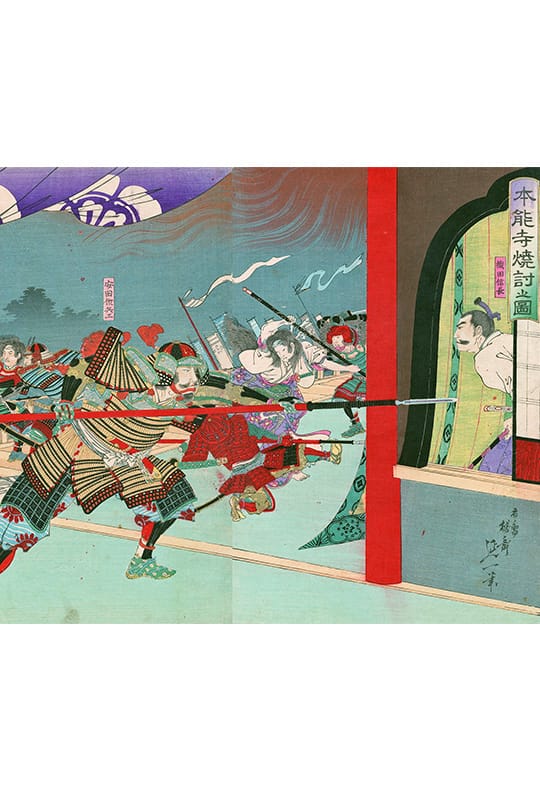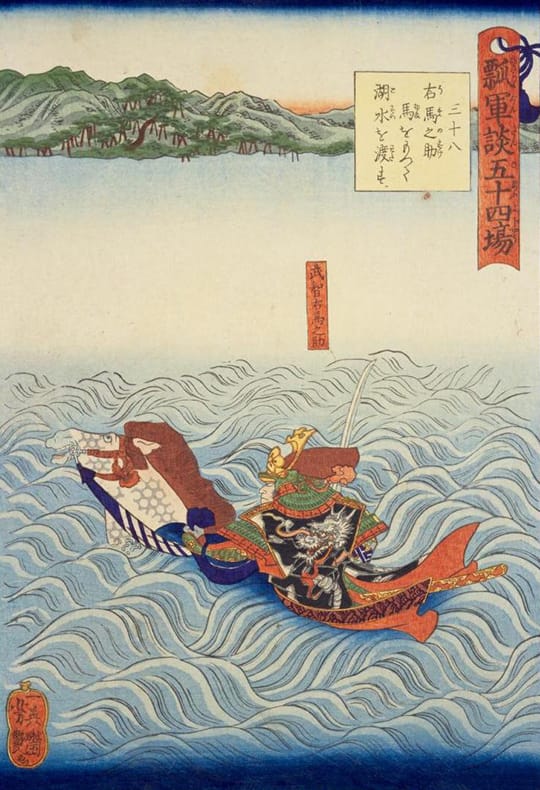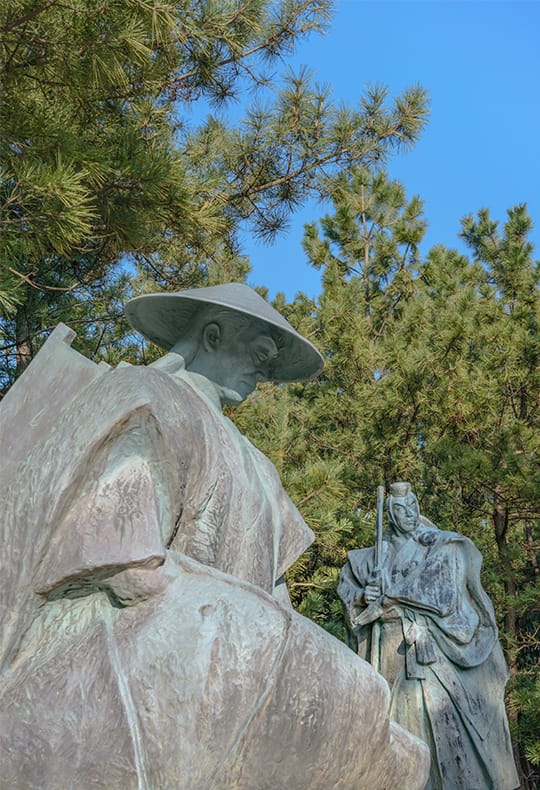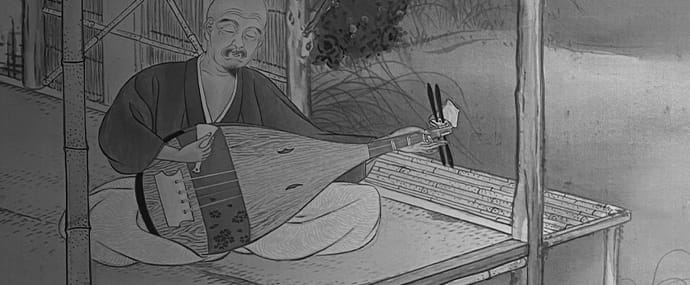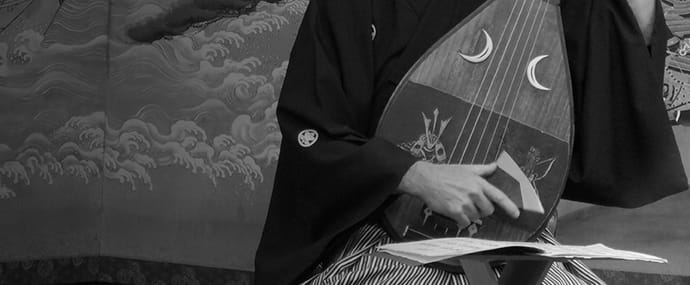
sekigahara
関ケ原
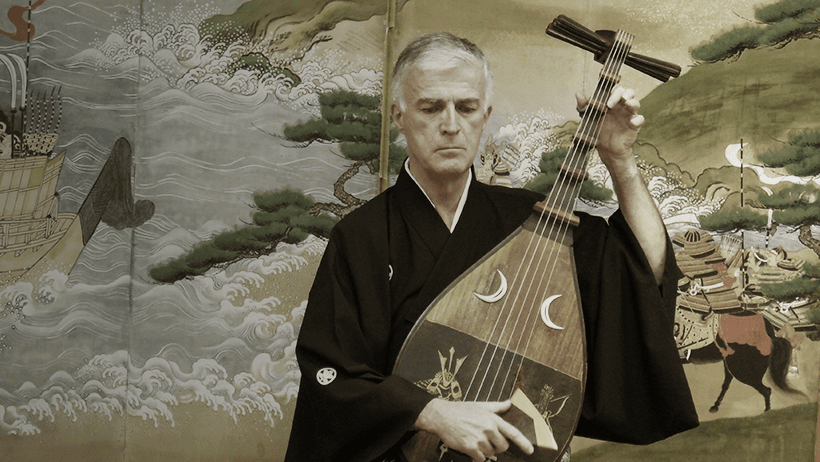
Introduction
Sekigahara in Gifu Prefecture is among the most renowned places in Japanese war history. After a long period of military struggles to unify the country, the fate of Japan for the following 250 years was determined on this battlefield on October 21st 1600. Here, the coalition forces from the Eastern provinces under the command of TOKUGAWA Ieyasu clashed with the alliance commanded by ISHIDA Mitsunari. Mitsunari remained faithful to his former lord, TOYOTOMI Hideyoshi, who had been the highest-ranking warlord and unifier of the country. Before his death in 1598, Hideyoshi had entrusted Ieyasu and four others to run state affairs on behalf of his six-year-old son, Hideyori. Ieyasu, however, had his own plans, which increasingly raised the faithful Mitsunari’s suspicions about his loyalty.
This growing mistrust was the reason for Mitsunari’s opposition to Ieyasu, and his final attack upon him and his allies at Sekigahara. One of Mitsunari’s allies, KOBAYAKAWA Hideaki, however, switched sides at a crucial moment in the battle. Instead of attacking Ieyasu’s troops, he joined them. This is perhaps the most famous act of treason in Japanese history, and forms the emotional core of this ballad, with its account of Mitsunari’s increasing desperation.
After Ieyasu’s victory, which marks the beginning of the TOKUGAWA period (1603-1867), Mitsunari was captured and beheaded as a traitor. This negative image was presented in the most famous chronicle of the TOKUGAWA period, the Sekigahara gunki taisei (1710), written by MIYAGAWA Ninsai. It was only in the Meiji period (1868-1912), when Ieyasu lost his deified status, that Mitsunari was reinterpreted in a positive light for his loyalty to the TOYOTOMI family. This ballad is based on this renewed image of this man of true integrity.
Synopsis
TOKUGAWA Ieyasu and four others had been entrusted with securing the political heritage of Hideyori, the six-year-old son of TOYOTOMI Hideyoshi, who, at the end of the 16th century, was the second of the Three Unifiers of Japan. Ieyasu, however, had different plans and immediately started to undermine the power of the TOYOTOMI House. To thwart Ieyasu’s treasonous plans, ISHIDA Mitsunari, Hideyoshi’s most faithful retainer, formed a coalition of approximately 100,000 troops in Western Japan.
In this ballad, Ieyasu was in Oyama on his way to attack the army of UESUGI Kagekatsu, when he was informed of Mitsunari’s military challenge. With 80,000 men, Ieyasu moved westwards and met Mitsunari’s troops near the pass of Sekigahara in present-day Gifu Prefecture.
On the 21st of October, 1600, Mitsunari was with his closest men on Mt. Sasao from where he directed his troops. He waited until Ieyasu’s forces were positioned in the valley so that they could be ambushed from the hillsides. At that moment, he lit fires on Mt. Tenman and Mt. Maruyama to signal to Hideaki that he should start the deadly attack from Mt. Matsuno’o. Nothing, however, happened. Ieyasu, who had secretly tried to convert Hideaki to his side, was also unsure of Hideaki’s intentions, and forced his hand by having 300 gunmen shoot at him. At this moment, Hideaki finally decided to join Ieyasu’s forces, and threw his entire strength against Mitsunari’s coalition members.
With this shift, Mitsunari immediately recognized that this battle would be lost. This was not only a loss for him, but it meant also the demise of the TOYOTOMI House. Mitsunari retreated in deep sorrow, accompanied by his two most faithful retainers GAMŌ Bitchū and SHIMA Sakon. They exchanged the last drink of farewell, water mixed with tears, and then they mounted their horses. They encouraged their troops to take Ieyasu’s head, but it was an impossible task. The Western army was rapidly destroyed at Sekigahara, allowing TOKUGAWA Ieyasu to change the history of Japan for centuries. The Edo period (1603-1867) is also called the TOKUGAWA period.
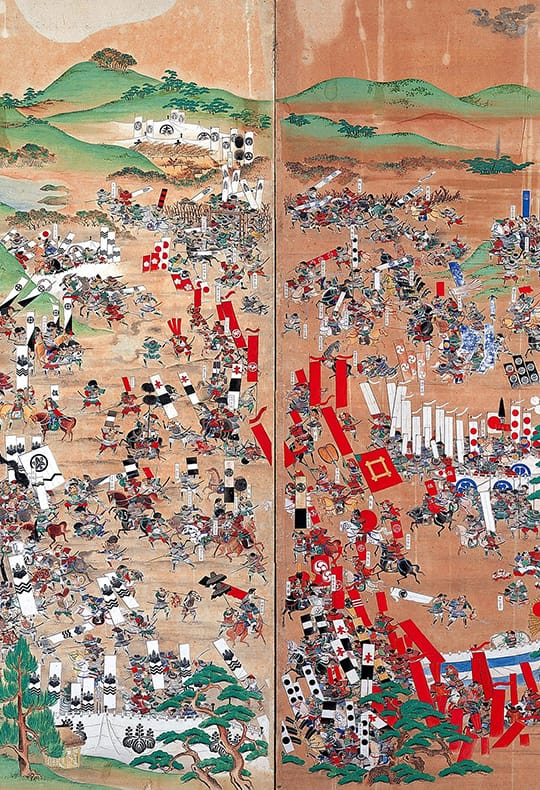
Lyrics
-
1. Prosperity and decline follow the mandate of heaven, Glanz und Elend sind des Himmels Fügung,
Kōbō wa ten no mei ni shite 興亡は天の命にして
-
2. and victory and defeat the fate of time. Sieg und Niederlage folgen dem Gebot der Stunde.
shōhai wa toki no un naru o 勝敗は時の運なるを
-
3. It is the error of adulating chroniclers Ist es nicht ein Fehler von Chronisten – die nur Speichel lecken –
omoneru shika ni ayamarare 諛ねる史家に誤られ
-
4. that a great man‘s name should remain buried for ages dass ein großer Name tausend Jahre lang begraben wird
na wa senzai ni uzumorete 名は千載に埋もれて
-
5. with his eternally rotting corpse. und wie ein Leichnam bis in alle Ewigkeit verrottet.
kabane wa banko ni kuchihatsuru 屍は万古に朽ち果つる
-
6. The misfortune of so excellent a man must be lamented. Ist ein Held, dem solches widerfährt, nicht ein beklagenswerter Mensch.
fugū no ijin zo itamashiki 不遇の偉人ぞ悼ましき
-
7. And so, when Hideyoshi faced his last hour Als Hideyoshi seine letzte Stunde nahen sah,
sate mo Taikō gorinjū no sono kiwa ni 扨も太閤御臨終の其の際に
-
8. he summoned Ieyasu to his deathbed: da rief er (Ieyasu), er möchte an sein Sterbelager kommen:
onmakurabe ni meshiyose tamai 御枕辺に召寄せ給ひ
-
9. “Hideyori, my son, is still very young. „Jung ist noch mein Sohn Hideyori,
Hideyori imada osanakereba 秀頼未だ稚なければ
-
10. I ask that you serve as his guardian!” ich bitte dich, dass du für ihn regierst.“
hitoe ni kōken tanomiiru to 偏に後見頼み入ると
-
11. His desires for the future clearly expressed, Er äußerte den Wunsch mit Nachdruck,
kōji o kataku yuigon shi 後事を堅く遺言し
-
12. he found his final place of rest on the hill of Amidagamine. kurz bevor er seine letzte Ruhe auf dem Hügel Amidagamine fand.
Amidagamine ni yasurakeku 阿弥陀が峰に安らけく
-
13. After Hideyoshi had fallen into eternal sleep, Nachdem Hideyoshi in den Schlaf der Ewigkeit gesunken war,
nemuritamaishi sono nochi wa 眠り給ひし其の後は
-
14. and despite having accepted the highest of charges, begann Ieyasu jedoch schnell
takko kimei no tainin o 託孤寄命の大任を
-
15. Ieyasu began to slowly – obwohl er doch den hohen Auftrag hatte –
oberu mi nagara Ieyasu wa 帯べる身ながら家康は
-
16. acquire followers as he spread his wings, seine Fänge nach der Macht hin auszustrecken.
shidai ni uyoku o yashinaitsu 次第に羽翼を養ひつ
-
17. plotting the destruction of the TOYOTOMI house. Hideyoshis Haus zu stürzen
tsui ni wa HŌKE o kutsugaeshi 終には豊家を覆へし
-
18. Takeover was his hidden motive, und die Staatsgewalt an sich zu reißen, war sein dunkler Plan,
totte kawaran shitagokoro 取って代らん下心
-
19. but it could be dimly perceived through a thin veil. den er aber kaum kaschierte.
kakusu to sureba hono miete かくすとすればほの見へて
-
20. Despite Nanzan’s reputation as impregnable, Auch wenn Nanzan als standfest galt,
Nanzan furaku to utawareshi 南山不落と謡はれし
-
21. Ieyasu caused the foundations of Hideyoshi’s Ōsaka castle so brachte Ieyasu das Fundament von Hideyoshis Schloss
Ōsakajō no ishizue mo 大阪城の基礎も
-
22. to tremble and shake. schon bald ins Wanken.
yurugisomeshi zo daiji naru 揺ぎ初めしぞ大事なる
-
23. The lord of Sawayama Castle in Gōshū Hier, in Gōshū, im Schloss Sawayama,
koko ni Gōshū Sawayama no jōshu 茲に江州佐和山の城主
-
24. ISHIDA Mitsunari ahnte ISHIDA Mitsunari, der Landesfürst,
ISHIDA Jibunoshōyū Mitsunari wa 石田治部ノ少輔三成は
-
25. discerned Ieyasu’s intentions was Ieyasu plante
toku Ieyasu no kyōchū o minuki 疾く家康の胸中を見抜き
-
26. and wracked his brains for a plan of action. und zerbrach sich seinen Kopf.
chiji ni kokoro o kudakishiga 千々に心を砕きしが
-
27. In secret, he had arranged with UESUGI Kagekatsu Er sprach sich im Geheimen ab mit UESUGI Kagekatsu,
hisoka ni UESUGI Kagekatsu to shimeshiawase 窈かに上杉景勝と牒し合せ
-
28. to trap the old fox Ieyasu, wie man Ieyasu, den alten Fuchs, in eine Falle locken
rōkai no Ieyasu o hasamiuchi 老獪の家康を挟み撃ち
-
29. and thus secure the peace of the TOYOTOMI House. und somit das Haus von Hideyoshi schützen könnte.
kunka o Taizan no yasuki ni okan to 君家を泰山の安きに置かんと
-
30. In all directions he sent an appeal. Weit in alle Lande schickte er Appelle:
geki o shihō ni tobasureba 檄を四方に飛ばすれば
-
31. The Middle Counselor MŌRI Terumoto, MŌRI Terumoto, “Kanzler der Mitte”,
MŌRI Chūnagon Terumoto 毛利中納言輝元
-
32. the Middle Counselor KOBAYAKAWA Kingo Hideaki und der “Zweite Kanzler”, KOBAYAKAWA Kingo Hideaki,
KOBAYAKAWA Chūnagon Kingo Hideaki 小早川中納言金吾秀秋
-
33. the regent ŌTANI GyōbuYoshitaka, der Regent ŌTANI Gyōbu Yoshitaka
ŌTANI Gyōbushōyū Yoshitaka o hajime to shi 大谷刑部少輔吉隆を始めとし
-
34. and many other warlords from the West und gar viele andere Fürsten aus dem Westen Japans
saigokugata no shodaimyō 西国方の諸大名
-
35. answered his call. folgten seinem Aufruf.
ōmune kore ni katan shite 概ね之に加担して
-
36. They formed an army of 100,000 horsemen, Über 100.000 Reiter kamen als Armee zusammen,
gunzei oyoso jūman yoki 軍勢凡そ十万余騎
-
37. and the flags of loyalty fluttered in the heart of the country. die loyal im Zentrum Japans ihre Banner flattern ließen.
giki o chūgen ni hirugaesu 義旗を中原に翻へす
-
38. At that time, Ieyasu, in the eastern provinces, Als im Osten sich Ieyasu
orishimo Ieyasu wa tōgoku nite 折しも家康は東国にて
-
39. was about to attack UESUGI’s army zu einer Schlacht mit UESUGI‘s Truppen vorbereitete,
UESUGI zei ni mukawan to 上杉勢に向はんと
-
40. and had assembled his troops in Oyama. – in Oyama die eigene Armee zusammenziehend –
Oyama ni zaijin nashitarishi ga 小山に在陣なしたりしが
-
41. Hearing about this armament, he was deeply shocked: hörte er vom Aufruf und erschrak zutiefst:
kaku to kiku yori ōi ni odoroki 斯くと聞くより大に驚き
-
42. “And so, Mitsunari has summoned those in favor of the TOYOTOMI House, „Zugunsten Hideyoshis knüpfte Mitsunari einen Bund
sate wa Mitsunari HŌKE no tame ni gi o tonae 扨は三成豊家の為に義を唱へ
-
43. and raised his standard to challenge me. und lässt die Waffen richten, um mich anzugreifen.
ware o utan to hata ageshi ka 我を討たんと旗挙しか
-
44. A most admirable foe, to be sure. Welch ein Gegner!
sasuga wa miageshi teki naru zo 流石は見上げし敵なるぞ
-
45. So it has to come to this: Damit wird die Lage für mich schwierig:
sa wa sarinagara kono mama ni さはさり乍ら此儘に
-
46. If I cannot destroy him Wenn ich ihn nicht jetzt zu schlagen weiß,
nanji o utade okan ni wa 汝を討たで置かんには
-
47. I shall never fulfill my long held ambition to rule the nation. erreich ich nie mein Ziel.
shukushi o togen koto katashi 宿志を遂げんこと難し
-
48. Let us go!” He turned back his troops, So lasst uns also ziehn!“
iza to bakari ni shi o kaeshi いざとばかりに師をかへし
-
49. leading his army of 80,000 men Mit diesen Worten führt‘ er seine Truppe – 80.000 Reiter –
hachiman yoki o insotsu shite 八万余騎を引率して
-
50. up the Eastern Highway. auf der Route Tōkaidō nach Westen an.
Tōkaidō o hasenoboru 東海道を馳せ上る
-
51. Both armies faced each other Viel schneller als vermutet trafen beide Heere aufeinander,
ryōgun hatta to deaishi wa 両軍ハッタと出合ひしは
-
52. at the border of Ōmi and Mino an der Grenze zwischen Ōmi und Mino,
Ōmi to Mino no kunizakai 近江と美濃の国境
-
53. at the indestructible Fuwa Gate. an dem Ort, der „Zollhaus, das man nicht zerstören kann“, genannt wird.
Fuwa no sekiya no na ni oedo 不破の関屋の名に負へど
-
54. Despite its name, one of the two heroes must be destroyed Trotz des Namen muss doch einer von den beiden Helden unterliegen,
ryōyū izure ka yaburedewa 両雄いづれか破れでは
-
55. in the battle at Sekigahara. denn es gibt kein anderes Geschick in Sekigahara.
kanawanu hame no Sekigahara 叶はぬ羽目の関ヶ原
-
56. It was the 15th day of the 9th month in 1600 Im 5. Jahr von Keichō, im 9. Monat am Fünfzehnten
toki shimo Keichō gonen kugatsu jūgonichi 時しも慶長五年九月十五日
-
57. when through the remaining morning mists, kracht im Morgendunst
nokon no kiri o tsunzakite 残んの霧をつんざきて
-
58. the first gunshot roared. der erste Schuss,
ichidō no jūsei todorokeba 一道の銃声轟けば
-
59. Soon after, the gates of hell burst open, und wenig später schon ist überall die Hölle los.
tachimachi koko ni shurajōri 忽ち茲に修羅場裏
-
60. men and horses mingle their cries with the sound of clashing swords, Die Pferde und die Reiter mischen Schreie mit dem Klirren vieler Schwerter.
jinba no otakebi tachi no oto 人馬の雄叫び太刀の音
-
61. a ghastly sight! Wahrer Schrecken herrscht auf allen Seiten!
ge ni susamajiki arisama nari 実に凄まじき有様なり
-
62. The strategic leader of the western armies, Mitsunari, Mitsunari, der Stratege von der Westarmee,
seigun no bōshu Mitsunari wa 西軍の謀主三成は
-
63. has aligned his main troops on Mt. Sasao. hat seine Garde auf dem Berge Sasao versammelt,
sono honjin o Sasao ni kamae 其の本陣を笹尾に構へ
-
64. A brown hood of silk crepe on his head, Seinen Kopf ziert eine braune Seidencrepe-Kapuze,
chajirimen no zukin o kamuri 茶縮緬の頭巾を被り
-
65. and over armor braided with dark blue ribbons, seine Rüstung, dunkelblau gewirkt mit Seidenbändern
kon‘ito odoshi no kogusoku ni 紺糸縅の小具足に
-
66. he wears a felt jacket. ist bedeckt mit einem Überwurf aus Filz,
ichimai rasha no jinbaori 一枚羅紗の陣羽織
-
67. Satin gaiters and straw sandals cover his legs and feet. und seine Beine stecken in Gamaschen über Strohsandalen.
donsu no kyahan nuno waraji 緞子の脚絆布草鞋
-
68. With a sword with red bronze fittings at his side, An der Seite hängt ein Schwert aus Bronze,
shakudōzukuri no tachi o haki 赤銅作りの太刀を佩き
-
69. he holds the late Hideyoshi’s beloved fan in his hand. und er hält in seiner Hand den Lieblings-Fächer von Hideyoshi.
Taikō iai no uchiwa o te ni shi 太閤遺愛の団扇を手にし
-
70. In the hail of shots that shake earth and heaven In dem Schießgefecht, das alle Welt in Angst und Schrecken jagt,
tenchi ni todoroku yadama no naka ni 天地に轟く矢玉の中に
-
71. he sits on his campstool, his face motionless, sitzt er doch reglos auf dem Feldstuhl,
shinshoku jijaku to shōgi ni yori 神色自若と床几に倚り
-
72. as he controls the steady attacks, überwacht das Kampfgeschehen,
kokkoku semaru ikusa no kokyū 刻々迫る戦の呼吸
-
73. his gaze following the fight as it moves to and fro. prüft das Auf und Ab der Schlacht mit klarem Kopf.
aun ni awasete niramishi ga 阿呍に合せて睨みしが
-
74. “Now is the time!” „Es ist so weit!“
shioai koko zo to mite toru ya 潮合こゝぞと見てとるや
-
75. From the peak of Mt.Tenman and Mt.Maruyama Mitsunari lässt auf Tenman und Maruyama, den beiden Bergen,
Tenman Maruyama nizan no itadaki ni 天満丸山二山の頂に
-
76. with signal fires, Feuer als Signale zünden
ten o kogasan aizu no noroshi 天を焦さん合図の烽火
-
77. the heavens burn, und damit den Himmel hell erleuchten.
satto bakari ni uchiagete さっとばかりに打上げて
-
78. Matsuno’o should now Hideaki auf dem Hügel Matsuno’o
Matsuno‘ozan naru Hideaki ni 松尾山なる秀秋に
-
79. rush towards the center of the eastern army sollte nun die Ostarmee in ihrer Mitte
toku tōgun no chūken o 疾く東軍の中堅を
-
80. in fierce attack! heftig attackieren.
tsukikuzuseyo to unagashikeri 突き崩せよと促しけり
-
81. But on the mountain yonder, Aber – was soll das denn – auf dem Hügel
shikaru ni kanata no yamanoe wa 然るに彼方の山の上は
-
82. only the white clouds move, schweben ja nur weiße Wolken,
shirakumo mayou bakari nite 白雲まようばかりにて
-
83. and all else is silent. alles bleibt vollkommen still.
shizumari kaette mie kereba 静まりかへって見えければ
-
84. Cruel pain spread through Mitsunari’s heart: Mitsunari fühlt ein Stechen in der Brust.
Mitsunari mune o itameshi ga 三成胸を痛めしが
-
85. The general of the eastern army, Ieyasu, Hatte wohl der General der Ostarmee, Ieyasu,
tōgun no shushō Ieyasu wa 東軍の主将家康は
-
86. had previously tempted Kingo Hideaki Kingo Hideaki abgeworben,
kanete Kingo Hideaki o 予て金吾秀秋を
-
87. with advantageous promises. ihn verlockt mit Angeboten?
ri o mote sasoi okitareba 利をもて誘ひおきたれば
-
88. Ieyasu incessantly beats his saddle, Heftig schlägt Ieyasu auf seinen Sattel
shikiri ni kuratsubo uchitataki 頻りに鞍坪打叩き
-
89. and commands 300 gunmen und befiehlt 300 Schützen
sasoi no teppō sanbyaku chō 誘ひの鉄砲三百挺
-
90. to open fire mit den Büchsen loszufeuern,
hibuta o kitte uchihanachi 火蓋を切って打放ち
-
91. and force Hideaki to decide for whom he fights. um sich Hideaki zu versichern.
kōhai ikani to semetsuketari 向背如何にと攻め付けたり
-
92. The thunders roll, Als da hundert Donner rollen,
hakurai ichiji ni todorokeba 百雷一時に轟けば
-
93. and from the peak of Mt. Matsuno’o kommen auf Berg Matsuno’o
Matsuno‘ozan no zetchō ni 松尾山の絶頂に
-
94. the radiant golden horse-standard of Hideaki goldne Pferdewimpel in Bewegung.
konjiki sanrantaru umajirushi 金色燦爛たる馬印
-
95. is seen moving straight towards Hideakis Truppen wenden sich
ugoku to miruya masshigura ni 動くと見るや驀然に
-
96. the staff officer of the western army. und stellen sich der Westarmee entgegen,
seigun no sanbō taru 西軍の参謀たる
-
97. ŌTANI Gyōbu and his warriors kämpfen gegen ŌTANI Gyōbu und seine besten Leute,
ŌTANI Gyōbu ga hatamoto megake 大谷刑部が旗本目がけ
-
98. are attacked as if facing an avalanche. ja, sie überwältigen sie wie Lawinen.
nadare o utte tsukikakaru 雪崩を打って突きかゝる
-
99. “What! Kingo Hideaki has betrayed us!” „Ha!! Kingo übt Verrat!“
suwaya Kingo ga uragiri nari to すわや金吾が裏切なりと
-
100. ŌTANI Gyōbu flies into a rage: ŌTANI Gyōbu sträuben sich die Haare:
Gyōbu wa dohatsu sakadatete 刑部は怒髪逆立てゝ
-
101. “You are Japan’s most detestable creature! „Du bist der Niederträchtigste in Japan!
onore Nippon ichi no hikyōmono おのれ日本一の卑怯者
-
102. How can this be tolerated?” Ach, wie konnte dies geschehen“;
yawaka sono mama okubeki zo to やわか其儘置くべきぞと
-
103. And swearing furiously, he repulses the attack. fluchend wehrt er die Attacke ab.
nonoshiri nagara mukaeutsu 罵りながら迎へ撃つ
-
104. Ieyasu smiles in glee, “Finally… Ieyasu aber lacht voll Schadenfreude:
Ieyasu sate wa to hokusoemi 家康扨はと北叟笑み
-
105. the battle will soon be decided for us. „Unsre Schlacht, wird bald gewonnen sein.
ikusa wa mohaya shōri nari 戦は最早勝利なり
-
106. We cannot let slip this chance to crush them”, Den Feind jetzt gänzlich zu vernichten, ist mein Ziel!“
kono ki o hazusazu kirikuzuse to 此の機を外さず切崩せと
-
107. and he conveys his demands through the ranks. Er teilt Befehle aus, die jeder zu befolgen hat.
kibishiku gechi o tsutōreba 厳しく下知を伝ふれば
-
108. The eastern army, hurling war cries, Vom Schlachtgeheul der Ostarmee begleitet,
tōgun isamite toki o age 東軍勇みて鬨を揚げ
-
109. swells through like raging billows. preschen TruppenMeereswogen gleich hervor.
dotō no gotoku oshiyosuru 怒涛の如く押寄する
-
110. Mitsunari stares at this scene, Mitsunari ist vor Schrecken starr,
Mitsunari kono sama o uchinagame 三成この様を打眺め
-
111. and swallows tears of indignation: erstickt beinah vor Wut und Tränen.
hifun no namida o nominagara 悲憤の涙を呑みながら
-
112. “Ah! because of Kingo Hideaki, our cause is lost. „Wegen Kingo ist jetzt unsere Sache ganz dahin,
aa Kingo ni koto o yaburarenu あゝ金吾に事を破られぬ
-
113. This is the end of the TOYOTOMI House.” das wird das Ende sein vom Hause TOYOTOMI.“
HŌKE no goun mo sue naru ka to 豊家の御運も末なるかと
-
114. Lifting his eyes towards the heavens, he sighs deeply, Mitsunari hebt die Augen seufzend auf zum Himmel,
ten o aoide kōtan shi 天を仰ひで浩歎し
-
115. and summons his faithful retainers, ruft dann seine treuesten Verbündeten
rōshin GAMŌ Bitchū SHIMA Sakon o maneki 老臣蒲生備中島左近を招き
-
116. GAMŌ Bitchū and SHIMA Sakon. “It is already over, GAMŌ Bitchū und SHIMA Sakon: „Der Entscheid ist schon gefällt,
sude ni daiji wa saritsuru zo 既に大事は去りつるぞ
-
117. and now is the time of our final farewell. uns bleibt nur noch die Trennung.
kore ya shūjū ichigo no wakare 是や主従一期の訣別
-
118. Come! Our cup of parting.” Lasst uns Abschied nehmen“,
iza mizusakazuki o to katawara no いざ水盃をと傍の
-
119. He scoops clear water from a rivulet with his hands. und er schöpft sich Wasser mit den Händen aus dem nahen Bach.
ogawa no shimizu te ni musubi 小川の清水手に掬び
-
120. “Drink! Quickly!” and he presents them with this last drink. „Trinkt schnell!“ spricht er zu ihnen.
toku maireyo to sashiidasu 疾くまいれよと差出す
-
121. Most of the water is lost, Wasser rinnt durch seine Finger,
mizu wa motoyori moretsuredo 水はもとより漏れつれど
-
122. but the remaining drops in their hands reflect aber in die letzten Tropfen seiner hohlen Hand
nokoru shizuku ni tataetaru 残る雫に湛へたる
-
123. the most intense feelings of bitterness. da fallen Trauertränen der Verbitterung,
senman muryō no nasake o ba 千万無量の情けをば
-
124. They drink these drops of water mixed with tears. die sie in ihrem Elend schlürfen.
namida to tomo ni oshiitadaki 涙と共に押し戴き
-
125. “It is now time. Farewell!” they say. „So sei’s denn“, sagen die Vasallen
saraba gomen to ryōnin wa さらば御免と両人は
-
126. Once again, they mount their horses. und besteigen wieder ihre Pferde,
futatabi koma ni uchimatagari 再び駒に打跨り
-
127. They frantically encourage their men feuern ihre Männer an und drängen sie,
kuzure tattaru mikata o hagemashi 崩れ立ったる味方を励まし
-
128. to take Ieyasu’s head, den Kopf des Ieyasu zu holen.
mezasu wa Naifu ga shirushi zo to 目指すは内府が首ぞと
-
129. and all are frenzied in their attempt. Alle werden wild wie losgelassne Höllenhunde.
ashura no gotoku takeritachi 阿修羅の如く猛り立ち
-
130. Despite giving their all, Doch auch, wenn sie einzeln bis zum letzten kämpfen,
chikara o kagiri ni tatakaishi mo 力を限りに戦ひしも
-
131. the western army finally loses. unterliegt am Ende doch die ganze Westarmee.
seigun tsuini haiboku shi 西軍遂に敗北し
-
132. Their banners sadly wave in the autumn breeze, Die Banner flattern traurig dort im Herbstwind,
gosan no kiri ni akikaze no 五三の桐に秋風の
-
133. for with the first wind, all was lost. der bereits beim ersten Stoß Verderben brachte.
fukisomeshi koso zehi nakere 吹き初めしこそ是非なけれ
-
134. Truly, beneath one general’s merits Wahrlich, hinter eines Feldherrn Ruhmestaten
ge ni isshō no kō narite 実に一将の功成りて
-
135. lie the remains of countless warriors in Sekigahara. liegen tausende Gebeine auf dem Feld von Sekigahara.
bankotsu kuchishi Sekigahara 万骨朽ちし関ヶ原
-
136. The world’s most eminent hero, Mitsunari, Der Held Mitsunari – einzig auf der Welt –
isse no eiyū Mitsunari ga 一世の英雄三成が
-
137. discarded his life for the cause of his lord, Hideyoshi, hat doch das Leben ganz für seinen Herrn geopfert;
kunka no tame ni mi o sutete 君家の為に身を捨てゝ
-
138. and became the model of a warrior. welch ein strahlend Vorbild ist er für die Ritter!
bushi no kagami o nokoshitaru 武士の鑑を残したる
-
139. But when asking about the traces of his solitary loyalty, Forscht man aber nach den Spuren seiner Heldentaten,
kochū kusetsu no ato toeba 孤忠苦節の跡訪へば
-
140. only the falling wind from Mt. Ibuki hört man auf dem Berg Ibuki nur den Wind verloren
Ibuki oroshi no shōshō to 伊吹颪の蕭々と
-
141. mournfully answers in the pines. in den Kiefern seufzen.
matsu ni kotōru bakari ni te 松に答ふるばかりにて
-
142. Bitterness shall forever prevail. Bitterkeit wird ewig bleiben.
urami ya nagaku nokoruran 恨や永く残るらん
-
143. Bitterness shall forever prevail. Bitterkeit wird ewig bleiben.
urami ya nagaku nokoruran 恨や永く残るらん
Notes
3. adulating chroniclers…Most history writing during the Edo period was construed in a way to please the ruling government. (See commentary in the introduction to this ballad.) 12. Amidagamine… This is a hill in Higashiyama ward in Kyoto where Hideyoshi is buried. 20. Nanzan… This city in China (Xi’an) was considered was considered stable and impregnable. 21. Osaka castle… this was Hideyoshi’s castle. With the destruction of the castle in 1615, Hideyoshi’s son, Hideyori, perished. This marks the onset of the unquestionable dominance of the TOKUGAWA-clan. 23. Sawayama in Gōshū… Sawayama is a hill in present-day Hikone City, Shiga Prefecture. A monument marks the location where Mitsunari’s castle once stood. 24. ISHIDA Mitsunari…He was one of Hideyoshi’s Five Commissioners, gobugyō. 27. UESUGI Kagekatsu…He belonged to Hideyoshi’s Council of “The Five Elders” that, at his deathbed, he entrusted to run the affairs of state for his underage son. Kagekatsu was among the most powerful warlords of the time with the immense fiefdom of Aizu in Fukushima Prefecture. Kagekatsu preceded Mitsunari in working against the growing dominance of TOKUGAWA Ieyasu. 31. Chūnagon MŌRI Terumoto…The title of chūnagon refers to “Counselor of the Second Rank” in the Imperial Bureaucracy. Terumoto was a rich daimyō based in western Honshū, the main island of Japan, in a region comprising the prefectures of Tottori, Shimane, Hiroshima, Okayama, and Yamaguchi. 32. KOBAYAKAWA Kingo Hideaki…Hideaki was a nephew of Nene, the wife of the late Hideyoshi. He is a crucial figure in the battle, as his treason allowed Ieyasu’s eastern allied armies to win. A full explanation of his name: Kingo is an ancient Chinese term for a rank in the Imperial Guard. KOBAYAKAWA is the name of the family which had adopted him. 33. ŌTANI Gyōbu Yoshitaka…his first name was actually Yoshitsugu. In most Edo-period sources, however, period his name is given as Yoshitaka. He was one of ISHIDA Mitsunari’s staunch allies. When he heard about the defeat of Mistunari’s coalition, he committed suicide on the battlefield. 40. Oyama… Oyama is nowadays a city in Tochigi Prefecture. 52. Ōmi and Mino…Ōmi is present-day Shiga Prefecture, and Mino is the southern part of Gifu Prefecture. 55 Sekigahara…This battlefield is located in Sekigahara town, Fuwa-gun, Gifu Prefecture. 63. Mt. Sasao… This mountain, where the Western armies of Mitsunari were positioned, is to the northwest of Sekigahara. 75. Mt. Tenman and Mt. Maruyama…Mt. Tenman is to the west of Sekigahara, and south of Mt. Sasao. The armies of UKITA, KONISHI and SHIMAZU were positioned here. Mt. Maruyama, also called Okayama, was the location of KURODA Nagamasa’s forces. 78. Mt. Matsuno’o…Kingo Hideaki had his troops positioned on this mountain to the southwest of Sekigahara. 115. GAMŌ Bitchū and SHIMA Sakon… both were high-ranking officers under Mitsunari’s command. 140. Mt. Ibuki…Mt. Ibuki, with an elevation of 1377 meters, is located to the northwest of Sekigahara, and famous for strong winds from its peak.

Music Notes
This extensive ballad tells the story of what may be the most famous battle in Japanese history. It is thus hardly surprising that the piece abounds with numerous examples of seme instrumental interludes. Seme means “attack,” and this large group of interludes is used for all dramatic action. In this piece, there are seven technically demanding virtuoso seme patterns. The artistic challenge for the performer, however, is not merely to imbue these interludes with dramatic energy, but to carefully consider the relation of tempo and narrative progress, and perform only one or two in an extremely splashy fashion.
Of great interest in this composition is that a seme interlude, Otsu kuzure no ni, is used at a quiet subdued moment. After line 125, before the onset of the short final battle, Mitsunari, who realizes defeat is unavoidable, exchanges the drink of farewell with his two closest retainers, GAMŌ Bitchū and SHIMA Sakon. As they shed tears of sorrow and anger of what had happened, they use the expression, saraba, “and so it shall be.” Normally, at moments such as this, a subdued interlude with an unclear rhythmic profile would be used, but the composer chose a clearly articulated seme interlude. Should this interlude be performed at the customary seme tempo, the energetic expression would destroy the sad climax of this emotionally rich passage.
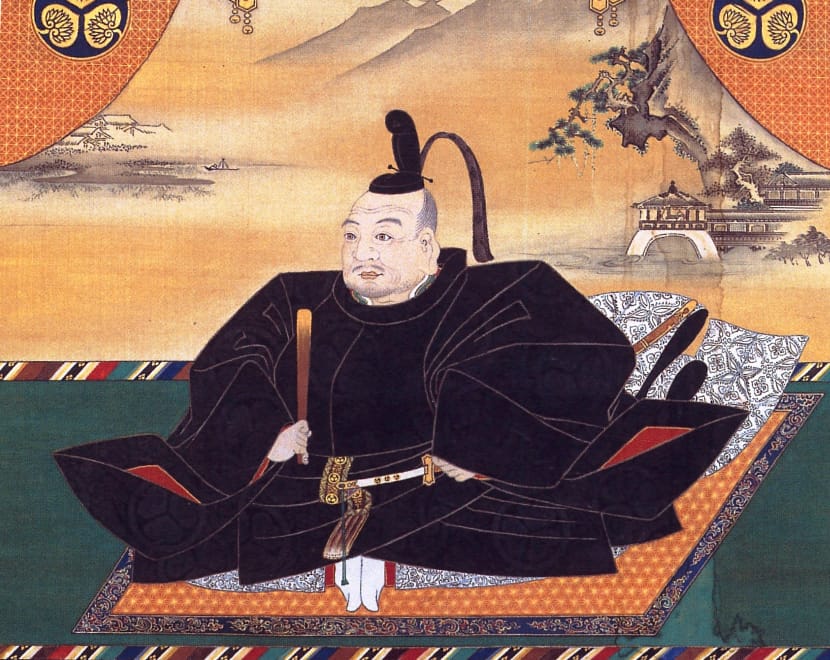
Playing a seme interlude at a reduced tempo to impart the deep tragic feeling required by this moment, however, is extremely challenging. Should the performer succeed, an extraordinary moment of profound beauty emerges. The battle scenes, which dominate this ballad, are suddenly infused with a deep sadness that arises from retrospection. The negative association of seme interludes with dramatic action passages acquires an unmistakable melancholy. With the conclusion of the ballad, the listener must reflect upon the work in its entirety, at which point the initial impression of valor on the battlefield is tainted with sorrow through the subdued reinterpretation of this one interlude at the end of the ballad.
